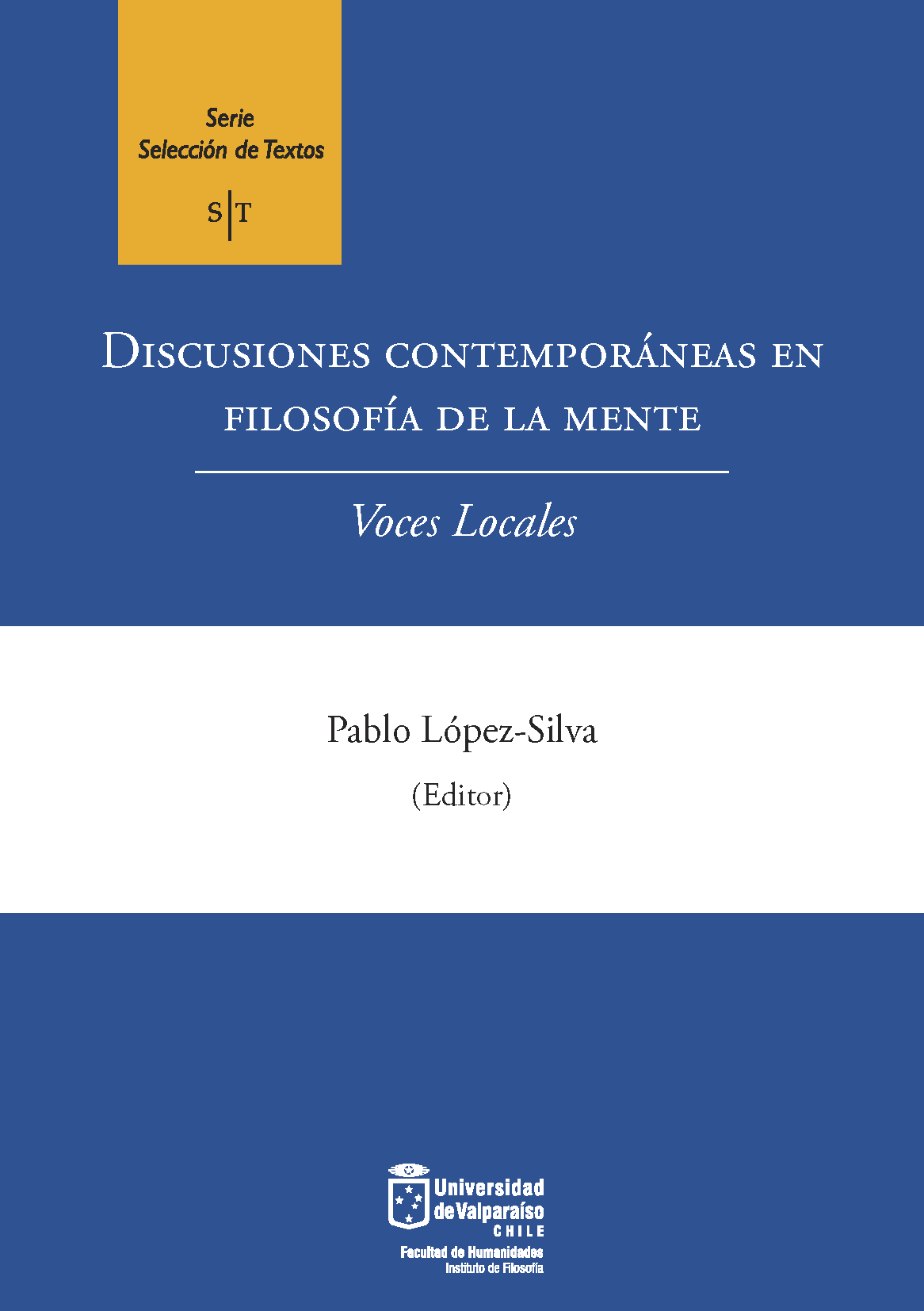La mente agencial: elementos para una teoría de las atribuciones de agencia mental
DOI:
https://doi.org/10.22370/sst.2019.7.4963Palabras clave:
Atribuciones de agencia, agencia motora, agencia mental, deliriosResumen
El concepto de atribución de agencia mental refiere al acto mediante el cual un sujeto asigna agencia a un pensamiento en primera persona. Esta noción nace en filosofía en el contexto de la discusión sobre la forma en que los humanos asignan agencia a sus propios movimientos corporales. Con el fin de contribuir al desarrollo de la discusión en el plano mental, este capítulo describe las dos ofertas teóricas más populares en el debate motor y analiza la forma en que éstas se han adaptado a la dimensión mental. Luego, se elabora una crítica sistemática a la estrategia paralelista que subyace a tal adaptación y, finalmente, se intenta clarificar el explananda para una posible teoría sobre las atribuciones de agencia mental mediante un análisis de las principales propiedades fenoménicas que podrían estar asociadas a la agencialidad del pensamiento
Descargas
Referencias
Aarts, H., Custers, R., y Wegner, D. (2005). On the inference of personal authorship: Enhancing experienced agency by priming effect information. Consciousness and Cognition. 14(3), 439-458.
Assal, F., Schwartz, S., & Vuilleumier, P. (2007). Moving with or without will: functional neural correlates of alien hand syndrome. Annals of Neurology: Official Journal of the American Neurological Association and the Child Neurology Society, 62(3), 301-306.
Bayne, T., y Pacherie, E. (2007). Narrators and Comparators: the architecture of agentive self-awareness. Synthese. 159., 478-479.
Montague, M., & Bayne, T. (2011). Cognitive phenomenology: an introduction. Cognitive phenomenology.
Billon, A. (2013). Does consciousness entail subjectivity? The puzzle of thought insertion. Philosophical Psychology, 26(2), 291-314.
Campbell, J. (1999). Schizophrenia, the Space of Reasons, and Thinking as a Motor Process. Monist, 82(4), 609–625.
Carruthers, G. (2012). A Metacognitive model of the sense of agency over thoughts. Cognitive Neuropsychiatry. 17(4). 291-314.
Chambon, V., Wenke, D., Fleming, S., Prinz, W., y Haggard, P. (2013). An online neural substrate for sense of agency. Cerebral Cortex. 23(5) 1031-1037.
Feinberg, I. (1978). Efference copy and corollary discharge: Implications for thinking and its disorders. Schizophrenia Bulletin, 4(4), 636-640.
Frankfurt, H. (1976). Identification and externality. In A. O. Rorty (Ed.), The identities of persons (239–251). Berkeley: University of California Press.
Frith, C. D., Blakemore, S. J., and Wolpert, D. M. (2000). Abnormalities in the awareness and control of action. Philos. Trans. R. Soc. Lond. B Biol. Sci. 355(1404), 1771–1788. doi: 10.1098/rstb.2000.0734
Gallagher, S. (2000). Philosophical Conceptions of the Self: Implications for Cognitive Science. Trends in Cognitive Sciences 4(1), 14-21.
Gallagher, S. (2007). The Natural Philosophy of Agency. Philosophy Compass 2(2), 347- 357.
Gallagher, S. (2012). Multiple Aspects in the sense of agency. New Ideas in Psychology. 30(1), 15-31.
Gallagher, S. (2014). Relations between agency and ownership in the case of schizophrenic thought insertion and delusions of control. Review of Philosophy and Psychology. 6(4), 865-879.
Gallagher, S. (2017). Enactivism Interventions: rethinking the mind. Oxford: Oxford University Press.
Haggard, P., y Chambón, V. (2012). Sense of control depends on fluency of action selection, not motor performance. Elsevier. 125(3), 441-451.
Ito, M. (2008). Control of mental activities by internal models in the cerebellum. Nature Reviews Neuroscience, 9(4), 304– 313.
Kang, S., Im, C., Shim, M., Nahab, F., Park, J., Kim, D., Kakareka, J., Miletta, N., Hallett, M. (2015). Brain Networks Responsible for Sense of Agency: An EEG Study. Plos One. 10(8), 1-16.
López-Silva, P (2017). Me and I are not friends, just Acquaintances: On thought Insertion and Self-Awareness. The Review of Philosophy & Psychology. DOI: https://doi.org/10.1007/s13164-017-0366-z
López-Silva, P. (2018). Mapping the psychotic mind: A review on the subjective structure of thought insertion. Psychiatric Quarterly, 89(4), 957-968.
López-Silva, P (2019-En Prensa). ¿De quién son éstos pensamientos? Examinando el enfoque top-down de las atribuciones de agencia mental. Tópicos.
Marcel, A. (2003). The sense of agency: Awareness and ownership of action. In J. Roessler & N. Eilan (eds.), Agency and Self-Awareness: Issues in Philosophy and Psychology. Oxford, Clarendon Press.
Moore, J. (2016). What Is the Sense of Agency and Why Does it Matter? Frontiers in Psychology. 7(1272), 1-9.
Mullins, S., y Spence, S. (2003). Re-examining thought insertion.Semi-structured literature review and conceptual analysis. British Journal of Psychiatry. 182(4), 293-298.
Otto, T., Zijlstra, H., Goebel, R. (2014). Neural correlates of mental effort evaluation - involvement of structures related to self-awareness. SCAN. 9(3), 307-315.
Pacherie, E. (2007). The sense of control and the sense of agency. Psyche, 13(1), 1-30.
Pacherie, E. (2008). The phenomenology of action: A conceptual framework. Cognition, 107(1), 179-217.
Proust, J. (2009). Is there a sense of agency for thoughts? En L. O’Brien, M. Soteriou (eds.), Mental Actions, pp. 253-279. Oxford: Oxford University Press.
Schmahmann, J. D. (2004). Disorders of the cerebellum: ataxia, dysmetria of thought, and the cerebellar cognitive affective syndrome. Journal of Neuropsychiatry and Clinical Neuroscience, 16(3), 367–378.
Stephens, G. L., y Graham, G. (2000). Philosophical psychopathology: Disorders in mind. When self-consciousness breaks: Alien voices and inserted thoughts. Cambridge, The MIT Press.
Vosgerau, G., y Voss, M. (2014): Authorship and Control over Thoughts. Mind and Language. 29(5), 534-565.
Walsh, E., Oakley, D., Halligan, P., Mehta, M., y Deeley, Q. (2015). The functional anatomy and connectivity of thought insertion and alien control of movement. Cortex, 64, 380–393.
Wenzlaff, R., y Wegner, D. (2000). Thought Suppression. Annual Review of Psychology. 51, 59-91.
Zahavi, D. (2005). Subjectivity and Selfhood: Investigating the first-person perspective. Cambridge, MA: The MIT Press.
Descargas
Publicado
Número
Sección
Licencia

Esta obra está bajo una licencia internacional Creative Commons Atribución-NoComercial-SinDerivadas 4.0.

